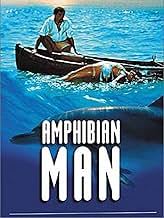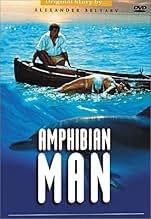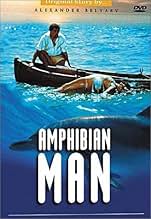Les habitants d'une ville côtière sont effrayés par des rumeurs faisant état d'une créature inconnue dans la mer.Les habitants d'une ville côtière sont effrayés par des rumeurs faisant état d'une créature inconnue dans la mer.Les habitants d'une ville côtière sont effrayés par des rumeurs faisant état d'une créature inconnue dans la mer.
- Réalisation
- Scénario
- Casting principal
- Récompenses
- 1 nomination au total
Vladimir Korenev
- Ichtyandr Salvator
- (as V. Korenev)
Anastasiya Vertinskaya
- Guttiere Baltazar
- (as A. Vertinskaya)
Mikhail Kozakov
- Pedro Zurita
- (as M. Kozakov)
Nikolai Simonov
- doktor Salvator
- (as N. Simonov)
Anatoliy Smiranin
- staryy Baltazar
- (as A. Smiranin)
Vladlen Davydov
- Olsen - zhurnalist
- (as V. Davydov)
Albert Antonyan
- Kristo
- (as A. Antonyan)
Nina Bolshakova
- Pevitsa
- (as N. Bolshakova)
Nikolay Kuzmin
- matros Zurity
- (as N. Kuzmin)
Mikhail Medvedev
- Botsman
- (as M. Medvedev)
Yuriy Medvedev
- Torgovets ryboy
- (as Yu. Medvedev)
Anna Nikritina
- maty Zurity
- (as A. Nikritina)
Aleksandr Zakharov
- Politselskiy
- (as A. Zakharov)
Sergey Boyarskiy
- Nachalnik okhrani tyurmy
- (non crédité)
Avis à la une
I also saw this movie as a kid on late night TV. I never forgot it and would love to see it on DVD. I think it was the first time I fell in love. The leading man/fish is one of the most beautiful and sweet characters I had ever seen.
I loved this film for many reasons. Most people who saw it, saw it as children on late night TV, but I didn't get to catch up with it till now. It has a lovely heart to it and although certainly naive and simple for todays standards, it possesses a warmth that is so often missing from other mostly american films of it's Genre and time period.
Certainly there are some strange aspects to it. The setting - which is either Spain or Mexico clashes with the Russian language and the Greek, Spanish and French character names. Perhaps this is done to give a sense of internationalism to the film.
But the thing I loved most about this film is it's social rather than political subtext. While many of this 1960's SCI-FI Genre concentrate on Nuclear accidents, fear of technology etc, Amphibian Man is instead concerned with the world that is created by simple human greed and cruelty. There is no BIG threat here, only trying to exist in a world that is made by men who are greedy and selfish. It is interesting to see that while US cinema was hysterical about the threat of nuclear technology and specifically the threat of Communist Russia, This Russian Film was more concerned with working within the world as it stood and looking at the problems that do exist rather than scaring people with over the top nuclear threats.
The Amphibian Man is not created by accident - but by scientific technology, and the purpose is not as a weapon but as a social advance. Even the "evil" Don Pedro - never thinks of using the "sea Devil" as a weapon but only to collect pearls and increase Pedro's personal fortune.
It is a truly interesting movie, allowing me to see another mind set of that era that is not the American one. And the bittersweet ending is far from unsatisfying.
Certainly there are some strange aspects to it. The setting - which is either Spain or Mexico clashes with the Russian language and the Greek, Spanish and French character names. Perhaps this is done to give a sense of internationalism to the film.
But the thing I loved most about this film is it's social rather than political subtext. While many of this 1960's SCI-FI Genre concentrate on Nuclear accidents, fear of technology etc, Amphibian Man is instead concerned with the world that is created by simple human greed and cruelty. There is no BIG threat here, only trying to exist in a world that is made by men who are greedy and selfish. It is interesting to see that while US cinema was hysterical about the threat of nuclear technology and specifically the threat of Communist Russia, This Russian Film was more concerned with working within the world as it stood and looking at the problems that do exist rather than scaring people with over the top nuclear threats.
The Amphibian Man is not created by accident - but by scientific technology, and the purpose is not as a weapon but as a social advance. Even the "evil" Don Pedro - never thinks of using the "sea Devil" as a weapon but only to collect pearls and increase Pedro's personal fortune.
It is a truly interesting movie, allowing me to see another mind set of that era that is not the American one. And the bittersweet ending is far from unsatisfying.
If this is the film I think it is, they showed it, alot, on a horror/movie program in New York in the 60's called "Thriller". I have been trying to find this for years! I tell all my friends about this film and I remember it as "The Amphibian Man". I also remember it was sad, very sad, that is why it stuck with me for years. Silly thing was, I thought it was an Italian film so that is where I've been trying to find it! I am a big horror film fan because at 4 years old, my older brothers watched these Saturday night New York Shows on Channel 5 (Creature Double Feature) and 11 (Thriller). This was during a time when there was not that many remotes so what they looked at, as the little sister, I had to look at too. Which is why I remember this film and haven't seen it since I was seven years old. (By that time we got cable, my brothers were older and I got the tv!) And let me add one more thing, many IMDb poster have written about films ripe for "remakes" for Hollywood Directors and Producers other than the ones they are doing. If I was one of those folks, I'd put this on my list to consider. This is a Speilberg-esque family sci-fi film just waiting to be remade. Then again, I like it just fine the way it is.
1961's "The Amphibian Man" (Chelovek-Amfibiya) was that rare Soviet title that crossed the Atlantic relatively intact, bypassing Roger Corman for a straightforward dubbing job that reduced the running time from 96 to 82 minutes but otherwise remained as faithful to its source as the Czech "Voyage to the End of the Universe." Only a year or so before John Lamb's "The Mermaids of Tiburon" offered a beautiful tail to tell for masculine viewers (as played by Diane Webber), here we have a male version to engage the female contingent. Vladimir Chebotaryou and Gennadi Kazanskiy are listed as codirectors of this adult fairy tale of love beneath the waves, kicking off in typical Hollywood frenzy with reports of a strange aquatic creature terrorizing South American beaches (shot off the scenic Crimean coast), convincing wealthy sea captain Pedro (Mikhail Kozakov) to switch from pearl diving to monster hunting while his reluctant bride Guttiere Baltazar (Anastasiya Vertinskaya) only agrees to marriage for the sake of her financially strapped father (Anatoliy Smiranin). An attempted escape goes awry when she dives into the water and loses consciousness as a menacing shark approaches, rescued from certain drowning by the 'Sea Devil' that Pedro is searching for, hardly the fearsome description of the papers but an all too human figure (Vladimir Korenev) wearing an elaborate costume of webbed hands and feet. The young man is named Ichtyandr, son of renowned scientist Salvator (Nikolai Simonov), who was forced to transplant a shark's gills to replace his offspring's damaged lungs, enabling him to exist above and below the water, essentially a first step to create a utopian society that will live in freedom beneath the sea. Guttiere is unaware of the identity of her actual rescuer (Pedro takes the credit), and is startled when Ichtyandr calls to ask if she's all right from his place on the ship's anchor, so smitten with this never before seen vision of loveliness that he braves the big city against his father's wishes to find her. For one who has lived a sheltered life away from the trials and tribulations of humanity, the lad is literally a fish out of water when dealing with greed and prejudice, still making a strong impression on the girl, who feels a flattering connection to him for his unwavering admiration for her. Pedro is never far away to squash their blossoming romance, and her refusal to accept his unconditional gift of pearls shows how misplaced pride can often be. An audience used to viewing wild stories set in outer space may well be taken aback by this tender, inner space venture, fabulous underwater photography and solid characterizations ensuring great success in its native Russia (a reported 65.5 million theater goers), yet for decades poor quality prints in the West have done it few favors. "The Amphibian Man" and "The Mermaids of Tiburon" both share the need to supply a villain to provide conflict, perhaps unnecessary and almost guaranteeing a downbeat finale.
a film like a Rubick cube . because it gives so many faces than remains more than a good adaptation of a novel but a sort of trip in the sensibility of a time. first because it could be a fairy tale. or a politic manifesto. or a lovely love story, remembering the Russian folklore. than, because, after decades, it remains fresh. for the special effects and story and acting. for the cultural references. and, in same measure, for its naive poetry. the clash of two worlds. and the fight for truth and justice. a noble cause. a beautiful girl. and the under water universe. it is enough for a form of magic who remains seductive after more than a half of century.
Le saviez-vous
- AnecdotesMassive box-office hit in USSR, it was seen by 65.5 million theater-goers.
- Citations
Gutiere Baltazar: [laughing] This must be love at first sight!
Ichtyandr Salvator: [simply] Is there any other kind of love?
- ConnexionsEdited into Bremenskie muzykanty (2001)
Meilleurs choix
Connectez-vous pour évaluer et suivre la liste de favoris afin de recevoir des recommandations personnalisées
- How long is Amphibian Man?Alimenté par Alexa
Détails
Contribuer à cette page
Suggérer une modification ou ajouter du contenu manquant





























